Graustark's Fiber Products
![]()
|
Our llamas produce
soft, silky fiber which we use in various
felting, spinning, Many of our products are available at the Butterfly Hill Farm Store Contact us at: ljb@graustarkllamas.com |
![]()
Handspun and Handwoven Items For Sale
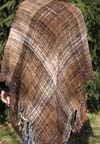 cross pattern on back |
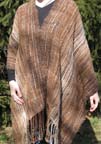 straight pattern on front panels |
Vshaped Shawl woven in one piece with no seams |
|
|
8"X 45" short mobius |
|
|
|
Woven Shawls |
|
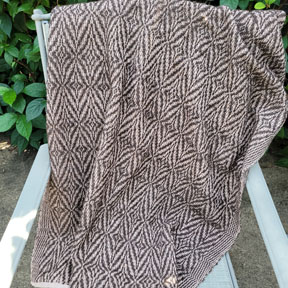 |
Overshot Throw Approximately 36 in. wide by 40 in. long Cotton/handspun llama |
|
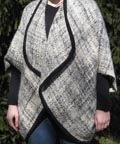 |
Ruana Wrap |
|
 |
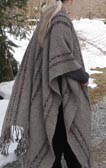 |
Woven Poncho |
|
|
Crochet headbands |
|
| Crochet Beanie Hat no lining |
||
|
||
|
|
|
|
It all begins on shearing day… Here at the farm, we try to blow much of the debris out of the llama’s coat before shearing. We sometimes brush the animals as well, but weather and time constraints usually make shearing something to be accomplished as quickly as possible. Remember, the llamas are sheared for their comfort—the fiber is just a by-product. We hand shear our animals while they stand tied to a fence or on a small enclosed area. A bag of hay makes the process easier for everyone. For us, shearing involves cutting the fiber from the animals using spring loaded hand shears. This leaves a nice 1/2 -1 inch length to help prevent fly bites and sunburn.
A
normal show cut takes about 20 minutes with a full body shear doubling the
time. The fiber is then bagged and labeled. |
|
|
When we are ready to use the fiber, it is carded using a drum hand carder before it is washed. Llama fiber contains no lanolin like sheep wool so it is not greasy or sticky to work with. It is then hand spun on a spinning wheel and plied. After plying, the yarn is washed in normal hair shampoo and a cream rinse is sparingly applied. After the yarn is dry it can be used for weaving, knitting or crocheting projects. Finished projects are washed again in shampoo and cream rinse and the excess water is spun out in the washing machine. The product is then dried in a machine dryer on low heat to full the fabric. Llama fiber does not shrink much, but should not be agitated or it will readily felt. All of our items are produced at the farm using our own spinning wheels and looms. We have sent some of our solid colored fiber out to commercial mills for washing and carding but the rest is done at the farm. |
|
•